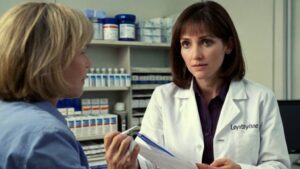“Improving Health Literacy”

Improving health literacy is vital for individuals to navigate the complex world of healthcare. It is the ability to obtain, understand, and use information related to health and medical care. However, according to recent studies, low health literacy is a growing concern and is linked to healthcare disparities and poor health outcomes.
This article aims to explore strategies for enhancing health literacy, highlighting the importance of understanding medical terms, and the role of healthcare professionals in promoting health education. We will also discuss community initiatives that have been successful in improving health literacy. By the end of this article, readers will have a better understanding of the impact of health literacy on individuals and society and potential ways to improve it.
As we dive into this topic, it is important to understand the definition of health literacy and its role in public health. Let us first explore why this issue should be a priority for both healthcare professionals and the general public.
Understanding Health Literacy
Health literacy is the degree to which individuals can obtain, process, and understand basic health information and services needed to make appropriate health decisions. This includes understanding medical terms, instructions, and health education materials. Low health literacy has been linked to poorer health outcomes and can contribute to healthcare disparities. According to the National Assessment of Adult Literacy, only 12% of adults have proficient health literacy.
This can lead to difficulties in navigating the healthcare system and following medical advice. Ultimately impacting overall health. However, improving health literacy can empower individuals to take control of their health and make informed decisions. It is important for public health initiatives to prioritize educating individuals on health literacy. Also, for healthcare providers to effectively communicate with patients using understandable language and materials. This can lead to improved healthcare outcomes and a more empowered patient population.
Importance of Understanding Medical Terms
Medical terminology can be complex and difficult to understand for individuals who are not trained in the healthcare field. However, accurate understanding of medical terms is crucial for effective communication between patients and healthcare providers. Misunderstanding medical terms can lead to confusion and potential harm. In fact, studies have shown that low health literacy is linked to poor health outcomes. Higher healthcare costs, and increased hospitalizations.
Patients need to have a basic understanding of medical terms to be able to make informed decisions about their health. For example, knowing the difference between acute and chronic conditions or understanding the side effects of certain medications can greatly impact treatment decisions. In addition, accurately understanding medical terms can also improve patient-provider communication and strengthen the patient’s role in their own healthcare.
Some commonly misunderstood medical terms include “benign” and “malignant,” “chronic” and “acute,” and “symptom” and “sign.” These terms may have different meanings in a medical context than they do in everyday language. Making it crucial for patients to have a clear understanding.
To enhance understanding of medical terms. Patients can ask their healthcare providers to use simpler language and provide visual aids or illustrations when discussing medical information. There are also online resources and glossaries available to help individuals better understand medical terms.
Overall, understanding medical terms is essential for patients to be actively involved in their healthcare and make informed decisions. Healthcare providers need to use clear language when talking to patients. This will ensure understanding and promote health literacy.
Enhancing Understanding of Medical Information
Patients often face challenges when it comes to understanding medical information. The complex language and terminology used in healthcare can be overwhelming and confusing, making it difficult for individuals to make informed decisions about their health. This is especially true for those with low health literacy, who may struggle with understanding medical jargon and navigating the healthcare system.
One of the key roles of healthcare professionals is to provide patient education and enhance understanding of medical information. This can include breaking down complex medical terms into simpler language, using visual aids or diagrams to explain procedures, and encouraging patients to ask questions and seek clarification.
Patients can also take an active role in improving their own health literacy. This can include asking for simplified explanations, bringing a trusted family member or friend to appointments for support, and utilizing technology to access reliable health information.
Technology can play a significant role in enhancing understanding of medical information. With the abundance of health information available online, patients can access resources, such as reputable websites and apps, to better understand their health conditions and treatments.
Overall, improving health literacy is a collaborative effort between patients, healthcare providers, and the community. By actively working towards enhancing understanding of medical information, individuals can make more informed decisions about their health, leading to improved healthcare outcomes for themselves and society as a whole.
Community Initiatives for Improving Health Literacy
Community-based programs are crucial in promoting health literacy and bridging the gap between healthcare providers and patients. These initiatives provide education and resources to individuals in their own neighborhoods, making it easier for them to access and understand important health information. By collaborating with community organizations, healthcare providers can reach a wider audience and address the specific needs and concerns of their patients. Successful programs have been implemented through partnerships with schools, libraries, and local health departments. These initiatives have shown to improve health literacy and empower individuals to take control of their healthcare. By working together, healthcare providers and community organizations can make a significant impact on improving health literacy and ultimately, overall health outcomes.
Role of Healthcare Providers in Promoting Health Literacy
Healthcare providers play a crucial role in promoting health literacy among their patients. As the primary source of medical information, it is their responsibility to ensure that patients understand their health conditions and treatment options.
Here are some ways healthcare providers can promote health literacy:
Effective Communication: Healthcare providers should use clear and simple language when communicating with patients. Avoid using medical jargon and provide explanations and visual aids to enhance understanding.
Encourage Questions: Patients may feel intimidated or overwhelmed in a healthcare setting, but it is important to encourage them to ask questions and clarify any doubts they may have. This can help improve their understanding of their health and treatment.
Provide Patient Education: Healthcare providers should take the time to educate patients about their health conditions, treatments, and preventive measures. This can be done through one-on-one discussions, written materials, or online resources.
Collaborate with Community Organizations: Healthcare providers can also work with community organizations to promote health literacy. This can include participating in health fairs or hosting educational workshops.
Effective communication and patient education are key in promoting health literacy and empowering patients to make informed decisions about their health. By taking an active role in promoting health literacy, healthcare providers can contribute to improving overall healthcare outcomes for their patients and society as a whole.
Conclusion
In conclusion, enhancing health literacy is crucial for improving overall healthcare outcomes and promoting patient empowerment. The impact of low health literacy on individuals and society cannot be ignored, as it leads to healthcare disparities and poor health outcomes. The use of complex medical terms further adds to the challenge of understanding medical information.
However, by implementing strategies such as simplifying medical language and utilizing technology, we can enhance patients’ understanding of medical information. Community-based programs and collaboration between healthcare providers and organizations also play a significant role in promoting health literacy. Ultimately, it is the responsibility of healthcare professionals to ensure patients have a clear understanding of their medical information.
By taking action and prioritizing health literacy, we can make a positive impact on society and improve overall healthcare outcomes. Let’s work together to enhance health literacy and create a more informed and empowered society.
https://7thavewellnessblog.com/?p=4443
https://www.ncbi.nlm.nih.gov/
FAQs
-What is health literacy?
Health literacy is the ability to obtain, process, and understand basic health information and services to make informed decisions about one’s health.
-Why is improving health literacy important?
Improving health literacy can lead to better health outcomes as individuals are able to understand and use health information to make informed decisions about their health.
-What are some ways to improve health literacy?
Some ways to improve health literacy include providing easy-to-understand health information, promoting health education and awareness, and improving access to healthcare resources.
-How can healthcare providers help improve health literacy?
Healthcare providers can help improve health literacy by using plain language when communicating with patients, providing visual aids and culturally sensitive materials, and encouraging questions and active participation in healthcare decisions.
-How can communities help improve health literacy?
Communities can help improve health literacy by promoting health education and awareness programs, providing access to reliable health resources and services, and creating a supportive and inclusive environment for individuals of all health literacy levels.







